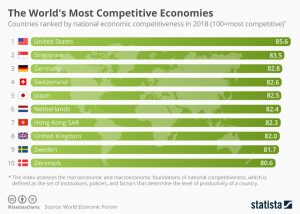The World Economic Forum (WEF) released its annual study on the competitiveness of the global economy this week. One of the most important indicators included in the report was an index ranking of the microeconomic and macroeconomic data in relation to national competitiveness. The WEF defines national competitiveness as the set of institutions, policies, and factors that determine the level of productivity of a country.
The core finding of the research this year is how economic competitiveness is evolving in a world that is being transformed by new digital technology. As a result, there are major risks for governments and business who are failing to adapt to and overcome current technological challenges.
The United States came first for national competitiveness, scoring 85.6 out of 100. This is primarily due to its good performance in the Business Dynamism, Financial System and the Labor Market categories. The World Economic Forum also mentioned that the world’s most competitive economies also have room to improve and the U.S. is no exception. It still has work to do in improving its score across the Institutions, ICT Adoption, and Product Market categories. Singapore came second with a score of 85.6 while Germany rounded off the top-three with 82.8.

Ask me anything
Explore related questions





